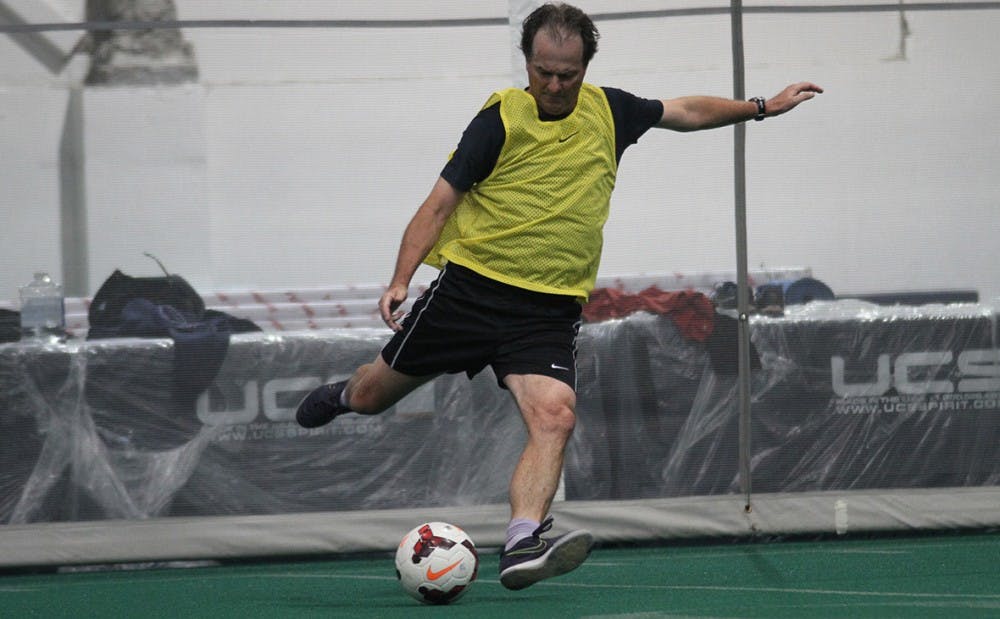But today, the 62-year-old coach is playing, too. It’s Monday; it’s lunchtime — of course he’s playing. For almost 10 years, on Monday, Wednesday and Friday, noon has meant soccer. Noon ball, they call it. It’s Dorrance, UNC men’s coach Carlos Somoano and a potpourri of assistant coaches, alumni and professional players. Whoever’s in town. Whoever wants to play.
“The critical mass is eight players,” Dorrance said. “If we don’t get eight players, we cancel it.”
Today, it’s six versus six. Dorrance emerges from the McCaskill Soccer Center at about 12:10 p.m., walking, then lightly jogging down the track that circles Fetzer Field. He’s wearing a black quarter-zip jacket over a gray T-shirt, black athletic shorts and holding a white rolling stick that he uses to limber up.
He’s still holding the stick as the game begins 20 minutes later on Hooker Fields, sandwiched between two groups of fitness classes running, stretching and playing soccer games of their own. It’s not an ideal day for soccer. There’s a slight chill in the air, and the ground is still wet from the night’s rain. But the Eddie Smith Field House, where noon ball is usually played, is occupied.
No matter.
Dorrance’s and Somoano’s team dominates in the first 10 minutes of play, jumping out to a 5-0 lead, as the opposing team — wearing neon green — struggles to jive.
“We got off to a really bad start,” Hassan Pinto, a UNC men’s soccer starter in the early ’90s, said afterward. “It just took us a few minutes to get in a rhythm with our team and organization.”
But once they find that rhythm, the game morphs into a chippy back-and-forth affair. A shootout, even. This self-proclaimed battle of “old farts” isn’t just some half-hearted pickup game. It’s a struggle between men who are accustomed to winning — who expect to win.
“Grant (Porter) won a 2001 national championship. You have guys that were leading goal scorers in the NCAA, like Peter for Seton Hall,” Pinto said. “You have Anson Dorrance, who’s an icon here. You have Carlos, who’s a national championship coach. You have myself, who was a top recruit and started here.
“We’re old, but we still transform into who we are, and we like to win. Everybody wants to win.”
And because of that desire, it gets physical — fast.
Dino Megaloudis, a four-year starter and All-ACC player for the men’s soccer team in the late ’80s, goes down with a knee injury just a couple of goals into the contest. He stretches out just behind his team’s goal and takes off his green jersey. He’s done.
To get the day's news and headlines in your inbox each morning, sign up for our email newsletters.
Matischak, before moving into a striker position, plays near the goal along with Dorrance. He takes a hard ball to the shin and, later, a rocket to the chest that elicits a yelp of pain.
At one point, Joe Crump, a volunteer assistant men’s coach, takes a ball to the face. It rattles him. He stands in the middle of the field with his hand on his head for a minute or two before returning to action.
And then there’s Dorrance, whose competitiveness continues to boil with age, whose love for the game hasn’t receded an inch. He begins the game on defense, still holding his stick. He loses it about 10 minutes later and begins creeping farther up the field. He doesn’t have the speed, no, but he has the footwork — he still has a deft touch and smooth dribble.
Halfway through, he loses the jacket. His gray shirt is soaked with sweat as he moves into the attacking third. He picks up a pair of assists, at one point connecting with Somoano, who splits two large orange cones with a wallop of a kick.
All the while Dorrance is the scoreboard yelling out the score and using his watch as an official timer — 1:30 p.m. is the end time. By the end the green team completes the comeback, winning the game 10-9. Improbable, maybe, but that’s noon ball.
No one keeps records or stats of any kind. With 52 weeks in a year and an average of at least two games a week, it’s a more than 100-game season, most of which is tucked away in the Eddie Smith Field House. “We don’t want anyone to know about this,” Somoano joked.
The games are a bonding experience between coaching staffs, a chance for Dorrance and Somoano to combine their coaching acumen on the field. Dorrance, who had reconstructive knee surgery four years ago, said he often tries to team up with Somoano and other experienced players.
“Because I’m a physical liability,” he said.
Pinto, who has played noon ball for 10 years, tells his wife all the time that he hopes he can continue playing like Dorrance does. He says it’s inspiring.
“If he can come out and play and compete, I can come out at 41 years old and compete,” Pinto said after the game.
He cracks up.
“Hopefully I’ll be out here for another 20 years and have a 30-year noon ball career.”
Dorrance said he doesn’t know how much longer he’ll physically be able to play, but if he has his way he won’t stop anytime soon.
“We all look forward to it, Monday, Wednesday, Friday, and it keeps me fit,” Dorrance says as he walks back to the McCaskill Soccer Center.
“I mean, heck, how many 62-year-olds get to play basically a contact sport with people half their age? For me, that’s a lot of fun.”
sports@dailytarheel.com



